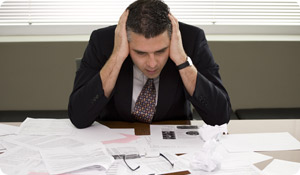
As more Americans put in 60, 70, or 80 hours at work each week, concerns about the health consequences increase. In some cases, workaholism fuelled by fear, a need for financial security, or even poor self esteem.
Being a workaholic isn't all bad. In some cases, it results in products and services that benefit millions such as the light bulb or telephone. However, there's a big difference between work efficiency and workaholism, states Bryan E. Robinson, a psychotherapist and author of Chained to the Desk: A Guidebook for Workaholics, Their Partners and Children, and the Clinicians Who Treat Them.
According to Robinson, even some clinicians don't see work addiction as a problem. But, he defines workaholism as an obsessive-compulsive disorder that makes you unable to regulate work habits and overindulge in work "to the exclusion of most other life activities."
Here are some of the health problems associated with being a workaholic:
- Chronic stress
- Anxiety
- Depression
- Anger
- Insomnia
- Headaches
- Ulcers
- Hypertension or high blood pressure
Chronic stress, anger and hypertension are all contributing factors to heart disease, the nation's number one health problem. Furthermore, work addiction can damage your marriage and friendships: A poor marriage and lack of a social network also negatively impact your health.
In some cases, the damage to your health can be extreme. The Japanese have a term for it, "karoshi," which means sudden death due to overwork. But, it doesn't have to come to this. Recognize the symptoms before it's too late, and take the necessary steps to protect your health against work addiction.
The Signs of Being a Workaholic
- You obsess about work at all times.
- You rarely see your family or friends.
- You don't take vacations, or you take your work with you.
- You're compelled to check in when you're away from work, by phone, email or text.
- Being away from work makes you feel anxious.
- You think you're indispensable at work.
- You put work ahead of your own health and your family.
- You never say "no" to work assignments or functions.
- Your sense of self worth is inextricably wrapped up in your work.
- You become defensive or angry when you're criticized for working being a workaholic.
Recovery from Workaholism
If the first time you ever heard of "work-life balance" was when the first lady Michelle Obama said it was a priority for her, maybe it's time you made it a priority as well.
Pause and take stock of your life. Is work addiction fulfilling? Are other areas of your life what you want them to be? Do you suffer from persistent health problems? Do a thorough self assessment.
Workaholics Anonymous also offers some sound advice on how to recover from being a workaholic:
- Just say no. It may be difficult at first, but commit to not taking on new assignments or other job duties until you've completed the ones you already have.
- Stop multitasking. Try to focus on one activity at a time.
- Assign more time than you need to tasks. When planning your schedule, overestimate the amount of time you'll need to complete tasks so your day isn't wall-to-wall meetings or activities.
- Schedule leisure time. Try to spend at least one hour every day devoted to fitness, hanging with your family or friends, or soaking up life's little pleasures. Pencil it in, and don't cancel it.
- Practice meditation. Before your day starts, spend 10 to 20 minutes doing deep breathing exercises, or visualizing how you want your day to go.
- Consider counseling. If your health or relationships are suffering and you still can't quit being a workaholic, consult a counsellor. Or, visit workaholics-anonymous.org to find out about a meeting in your area or a virtual meeting, and for additional support.





